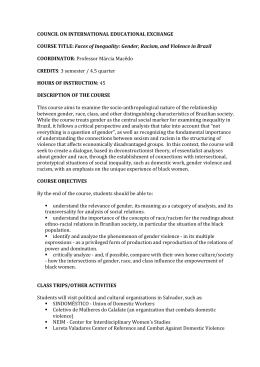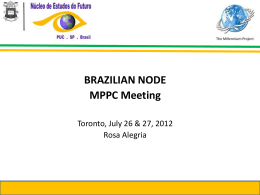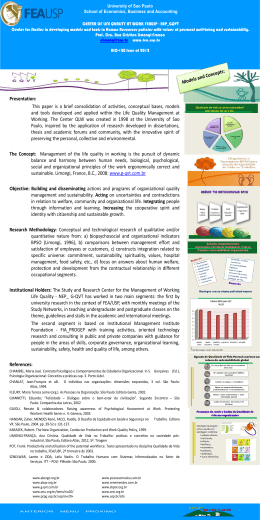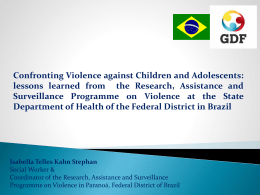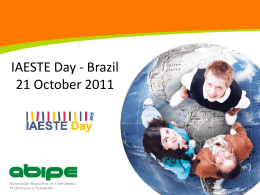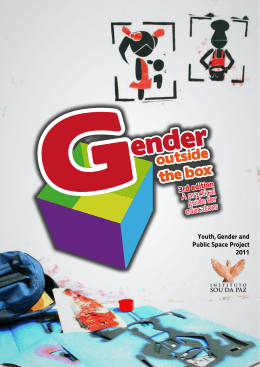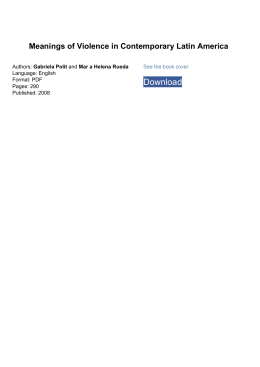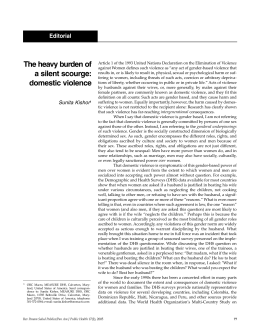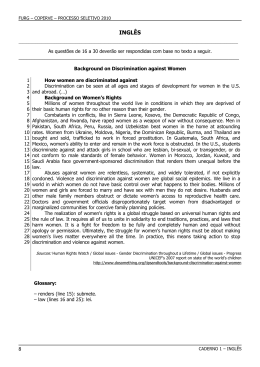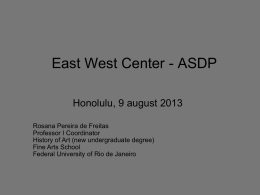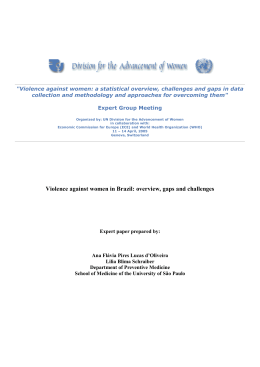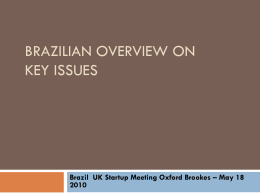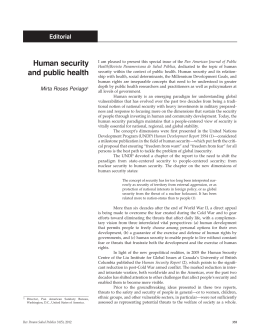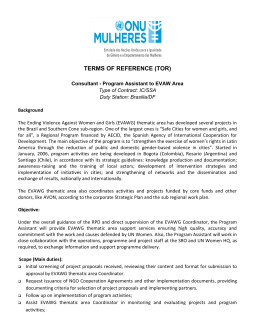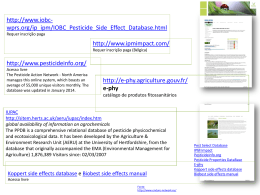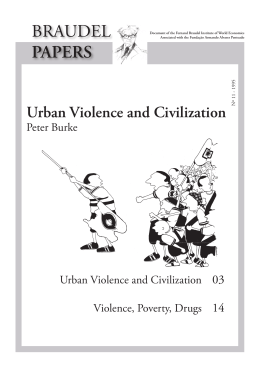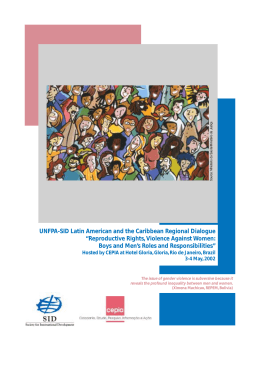SHELTERS FOR WOMEN EXPERIENCING DOMESTIC VIOLENCE IN RIO GRANDE DO SUL: MEANINGS AND CHALLENGES Sônia Maria A. F. Almeida Patrícia Krieger Grossi Jaqueline Goulart Vincensi Andréia Mendes dos Santos Research has as its object the refuges existing in the State of Rio Grande do Sul for women experiencing domestic in the family sphere. Refuges are important institutional support to protect and guarantee women's rights regarding the Maria da Penha Law. The refuges are still insufficient in this State, showing sometimes to be invisible whereas they are essential to guarantee and protect women’s right to freedom and respect. The perpetration of domestic violence passes through the time barrier, but is deemed indicators for resolutions of governmental and non-governmental actions and programs. The creation of refuges is part of the National Plan on Policies for Women, whose commitment was taken by the Brazilian Government and it is one of the goals to combat violence against women. METHODS • This research aims to analyze the contribution of refuges for women who face domestic violence, in the family sphere, through the identification of (1) the significance of such places for women; and (2) the action of the workers involved as well as facilitating and limiting factors for the contribution of refuges regarding social protection for women. The research involves eight (8) refuges, covering the State of Rio Grande do Sul in six (6) regions with similar geographic and economic characteristics. • Qualitative research was chosen, guided by the dialectical method. Data collection was based on mapping refuges identifying sociodemographic characteristics of sheltered women and analyzing semi-structured interviews with women, managers, employees and technical staff, totaling 41 people. Analysis it was used the content analysis according to Bardin (1977), adopting thematic analysis Research Objectives General objective: To analyze the contribution of shelters in meeting the demands of women, protection of life and coping with different forms of violence • Specific Objectives: To identify the perception of the contribution and relevance of shelters in fighting domestic violence in the family sphere from the women´s perspectives; To identify the actions developed in shelters; • To analyze the limits and possibilities of shelters in overcoming violent situations. PROFILE OF BATTERED WOMEN IN BRAZILIAN SHELTERS • Ages 20 years and 40 years • Education: Elementary Education, an illiterate and a high school • Of the eleven women interviewed four (4) worked outside the home before the shelter • Violence suffered for over three years, two live for more than 17 years with their violent partners. • Physical violence accompanied by psychological violence, one of the situations involved economic violence. Abuse and use of shelter for the first time. MAIN RESULTS 1. MEANING AND CONTRIBUTION SHELTERS FOR WOMEN OF For women: shelters are referral mechanisms for limit situations, represents a safe place necessary when women's life is in imminent danger WOMEN´S NARRATIVES "It improved a little, much better here, because we're not have been beaten up anymore." (AM2) “It is a kind of help, protection, and if I did not come here he'd kill me, it is a necessary support." (CM) "The greatest joy of my life is to have arrived here and here, my children and I have peace. WOMEN´S NARRATIVES • It is good because I have no place to go; • It helped me because I didn´t have a place to go. • It is good because I can think here, rebuild my life... I can sleep without fear... • I felt like I was in a cage before, now I feel like a bird, able to fly. • SHELTER´S WORKERS NARRATIVES "[...] I can see, it is a legitimate area of protection and assistance to women [..]" (BE). "[...] Is to welcome these women so they cannot be on the streets with their children [...] is not only shelter itself, but the prospect of reintegration into society [...] "(BG). SHELTERS´S WORKERS NARRATIVES • We tried to include children back into school system, or in a daycare, in a social service program after school hours, and try to put back these women in the labour market. 2. ACTIVITIES DEVELOPED INSIDE THE SHELTERS • Hosting space, encouragement and reflection for women: reframing of women's lives. • New perspectives in life: to regain self-esteem, freedom from violence. • Interdisciplinary work: the process of overcoming VIOLENCE through a collective construction of coping strategies. • Monitoring women after they leave shelter, working to ensure protection and fulfillment of perceived needs and discoveries, from the perspective of freedom and autonomy. LIMITS AND POSSIBILITIES OF SHELTERS IN OVERCOMING DOMESTIC VIOLENCE • Social vulnerability of women coupled with the precariousness of public social policies in most counties, especially in relation to housing need; • Lack of government funding, in one of the shelters, the food is provided through community donations, the staff are volunteers from an NGO, the city hall contributes only with the payment of the rental of a house Working conditions: Staff of different compositions is not always enough in number. Some are training volunteers, or load sharing with other services of the same social policy, undermining the services to women. CONCLUDING REMARKS This research tries to uncover the realities of women who live in shelters and their perceptions of violence in their lives, how they rebuild their lives, and how shelters contribute to build new projects of life without violence. Social workers need to build knowledge from women´s lived experiences and try to articulate other policies in order to meet abused women´s needs such as housing, jobs, and so on. Mostly, need to challenge preconceived views concerning battered women which still prevails in society and empower women to change the oppressive conditions of their lives. REFERÊNCIAS ALMEIDA, Suely S. de. Femicídio: algemas (in)visíveis do público-privado. Rio de Janeiro: Revinter, 1998. BARDIN, Laurence. Análise de conteúdo. Tradução de: Luís Antero Reto e Augusto Pinheiro. Lisboa: Edições 70; São Paulo: Martins Fontes, 1977. BRASIL. LEI MARIA DA PENHA. Lei n. 11.340/06, de 7 de agosto de 2006. Disponível em: http://www.planalto.gov.br/CCIVIL/Ato20042006/2006/Lei/L11340. htm>. Acesso em: 2 jul. 2008. CASTILLO-RUIZ, Paz et al. Refúgio para mujeres em situación de violência domestica. New York. Banco Interamericano de Desarollo, 2001. Disponível http://www.bvsde.paho.org/bvsacd/cd66/VDSRefMujeresSituacaoViolenciaD omestica.pdf>. Acesso em: 8 dez. 2009. COLLING, Ana. A construção histórica do feminino e do masculino. In: STREY, Marlene Neves; CABEDA, Sonia T. Lisboa; PREHN, Denise R. (Org.). Gênero e cultura: questões contemporâneas. Porto Alegre: Edipucrs, 2004. p.13-38. DAGORD, Ana Lúcia de Leão. Viva Maria: dez anos. 2003. Dissertação (Mestrado em Enfermagem) - Escola de Enfermagem, Universidade Federal do Rio Grande do Sul, Porto Alegre, 2003. DAZA, G.; ZULETA, M. Maquinaciones sutiles de la violencia. Santa Fé de Bogotá: Siglo del Hombre, 1997. FAZENDA, Ivani Catarina Arantes. Interdisciplinaridade: qual o sentido? São Paulo: Paulus, 2003. FOUCAULT, Michel. Microfísica do poder. 20. ed. São Paulo: Graal, 2004. ______. Vigiar e punir. 7. ed. Petrópolis, RJ: Vozes, 1987. ______. Em defesa da sociedade. São Paulo: Martins Fontes, 1999. ______. História da sexualidade I: a vontade saber. 16. ed. São Paulo: Graal, 2005. INSTITUTO BRASILEIRO DE GEOGRAFIA E ESTATÍSTICA. Disponível em: <http://www.ibge.gov.br>. Acesso em: 10 jul. 2006 e 28 maio 2010. LAGARDE Y DE LOS RÍOS, Marcela. Los cautiverios de las mujeres: madresposas, monjas, putas, presas y locas. 4. ed. México: Universidad Nacional Autónoma de México, 2005. OLIVEIRA, R. D. O Elogio da diferença: o feminino emergente. São Paulo: Brasiliense, 1979. RUFFA, Beatriz. Mujeres maltratadas: casas-refugio y sus alternativas. Buenos Aires: SENDA, 1990. SAFFIOTI, Helietti. Gênero, patriarcado, violência. São Paulo: Fundação Perseu Abramo, 2004. ______; ALMEIDA, Suely S. de. Violência de gênero: poder e impotência. Rio de Janeiro: Revinter, 1995. SCOTT, Joan W. Gênero: uma categoria útil de análise histórica. Educação e Realidade, Porto Alegre, n.16, p. 5-22, 1990. II PNPM. Plano Nacional de Políticas para as Mulheres. 2008. Disponível em: <https://www.presidencia.gov.br/spmulheres/ ct/livro.pdf>. Acesso em: 10 jan. 2009. SOARES, Barbara M. Mulheres invisíveis: violência conjugal e as novas políticas de segurança. Rio de Janeiro: Civilização Brasileira, 1999. STREY, Marlene Neves. Violência de Gênero: uma questão complexa e interminável. In: STREY, Marlene Neves; AZAMBUJA, Mariana P. Ruwer; JAEGER, Fernanda Pires (Org.). Violência, gênero e políticas públicas. Porto Alegre: Edipucrs, 2004. p.13-43. TERMO DE REFERÊNCIA PARA PROJETOS DE APOIO À CRIAÇÃO DE CASAS ABRIGO, 2004. Disponívem em: <https://www.presidencia.gov.br/spmulheres/ ct/livro.pdf>. Acesso em: 10 jan. 2009.
Download
